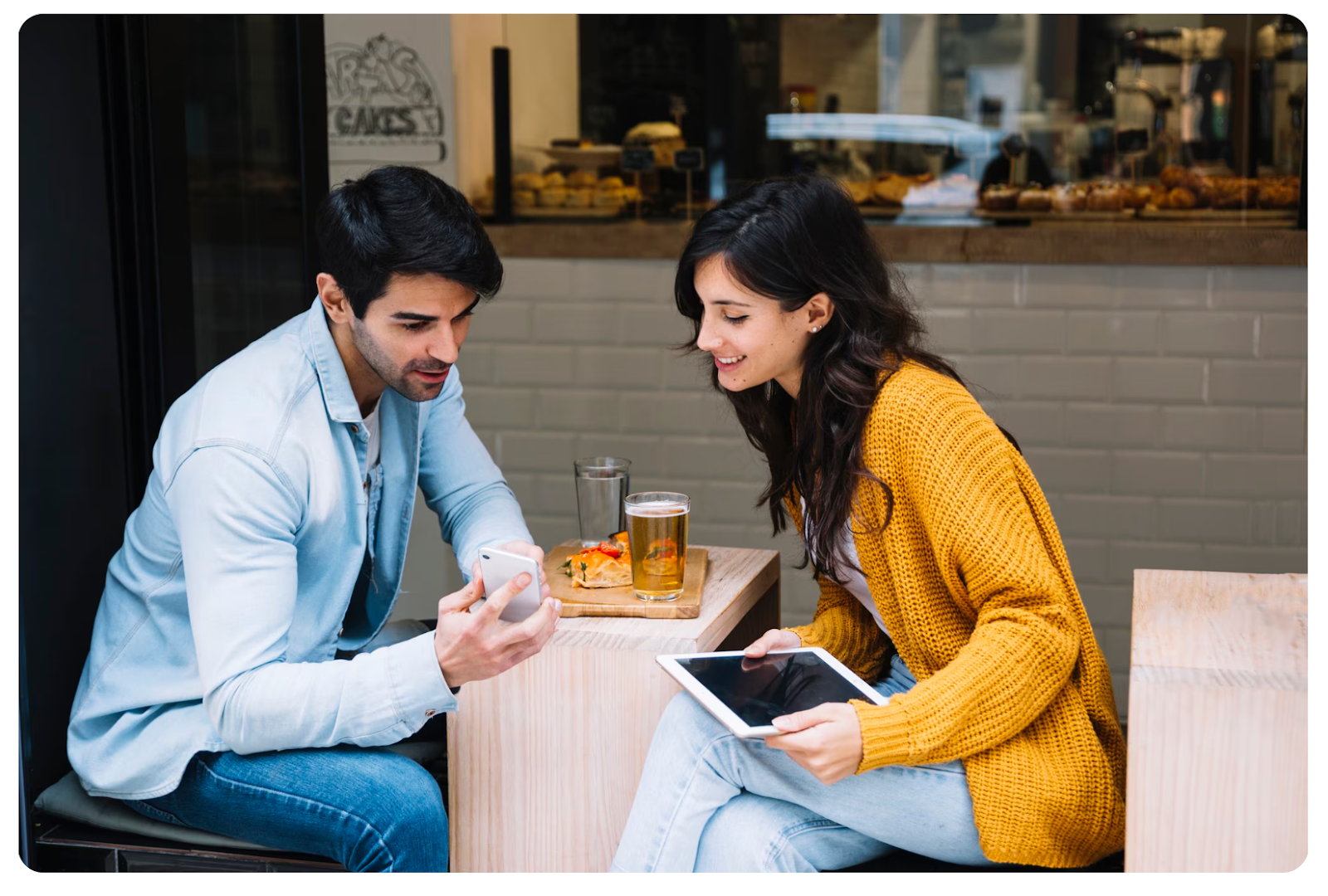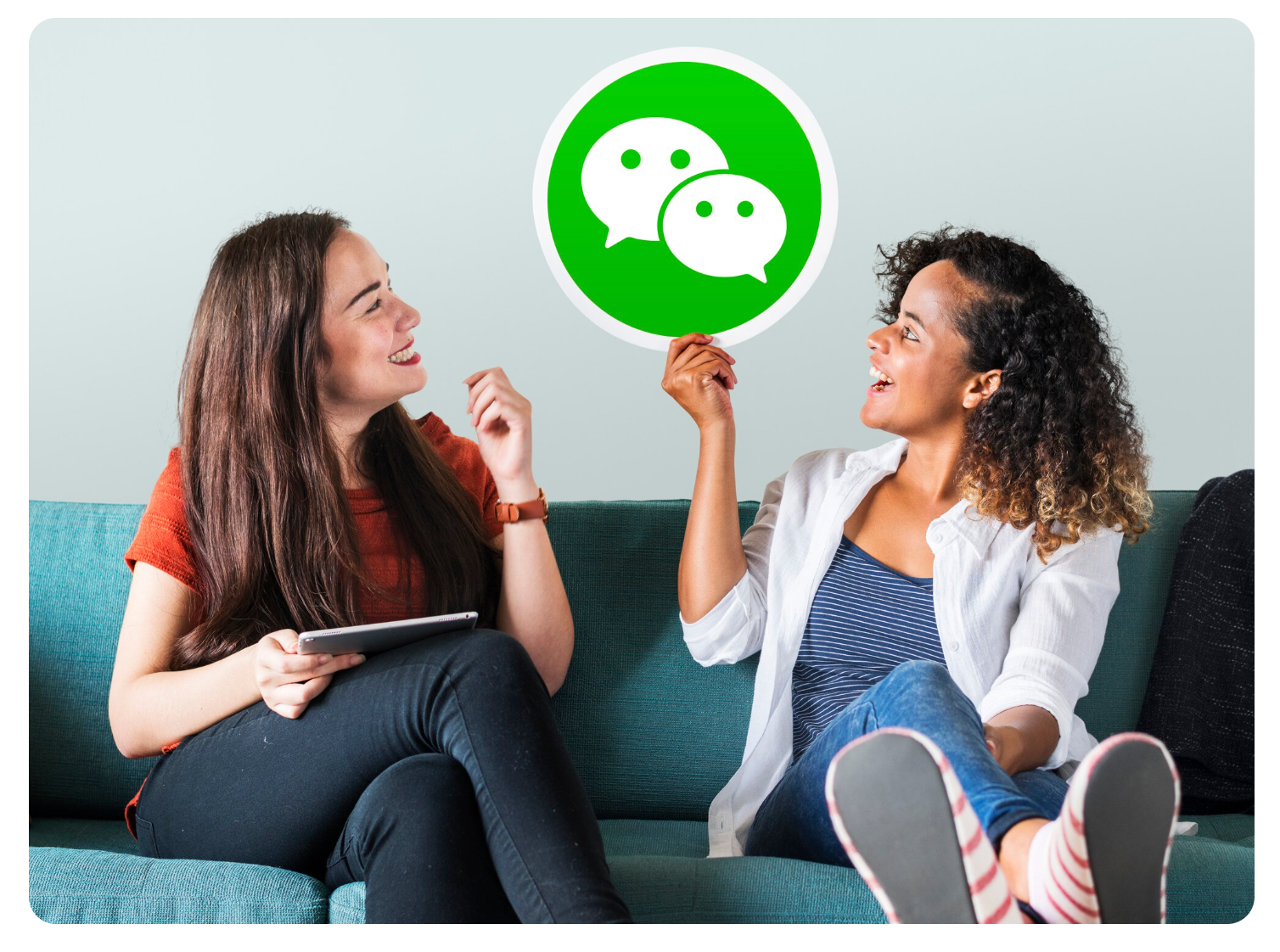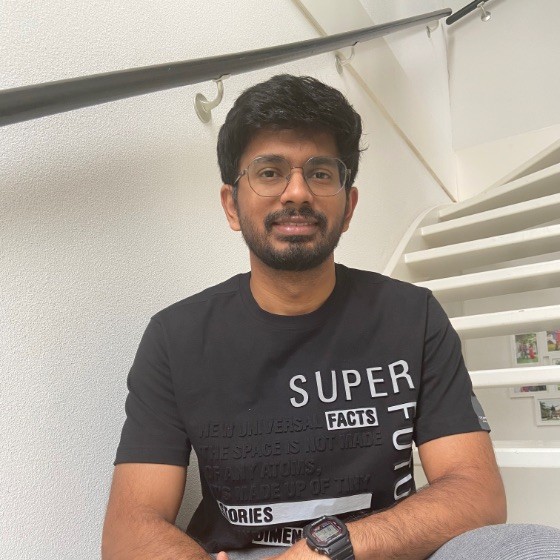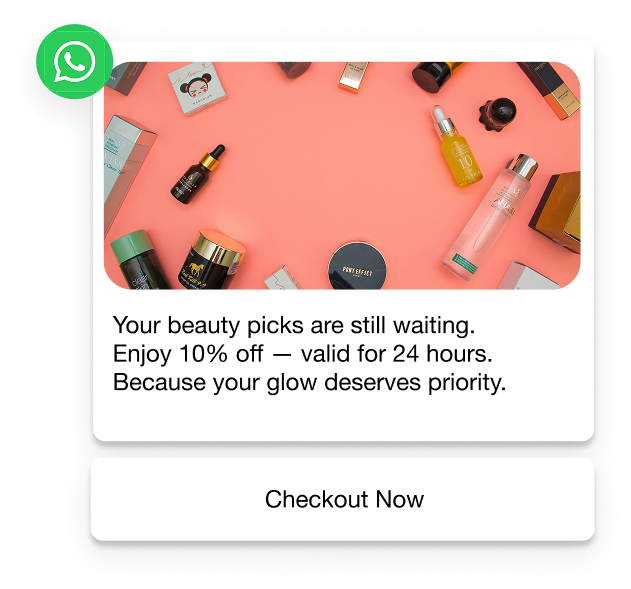Key Takeaways
- WhatsApp is where commerce really happens now—customers decide and buy inside chat, not on websites or email.
- Flowcart lets brands automate all sales, support, and retention flows in WhatsApp, delivering personalized advice and one-tap checkout for higher conversions.
- Building conversations, not just broadcasts, builds real loyalty and repeat sales. With Flowcart, WhatsApp quickly becomes the biggest revenue driver.
Your customers are already having conversations about your products, just not with you.
They're asking friends, reading reviews in group chats, and making purchase decisions inside WhatsApp long before they ever land on your website. Commerce is moving from storefronts to chat because that's where trust lives and decisions happen fastest.
A 95% message open rate on WhatsApp means your customers are 5x more likely to see your message than an email. They're not ignoring WhatsApp. They're ignoring everything else.
This article breaks down why WhatsApp has become the dominant channel for commerce and how Flowcart, an AI-powered conversational commerce platform, helps brands like Uncover turn those conversations into revenue.
We'll walk through a real case study where one brand 3x'd its revenue by shifting to WhatsApp-first selling.
What is Conversational Commerce?

Conversational commerce is the practice of selling products directly through chat platforms like WhatsApp, where conversations drive conversions.
Instead of pushing customers to websites or checkout pages, brands now engage, recommend, and sell right where users already talk. A shopper can discover a product, ask questions, get personalized advice, and complete payment, all within the same chat.
It eliminates the biggest barrier in online shopping; the gap between interest and action. Conversations replace clicks, making buying feel as natural as messaging a friend.
Why Email and Ads Can't Compete with Whatsapp in 2025?
Email and ads are losing their edge. Email campaigns average just 20% open rates, meaning most messages never get seen. Social ads drown in endless content, while SMS often feels intrusive and out of context.
WhatsApp is different. It’s where customers already spend their time, checking messages before coffee and replying faster than on any other channel. This isn’t preference; it’s habitual behavior.
Over the past three years, email open rates have dropped by 25%, while WhatsApp engagement holds steady at 95% (Meta, 2024). The medium hasn’t changed, but customer behavior has.
Conversational commerce capitalizes on this shift by meeting customers where they already are: in real-time chat. With Flowcart, brands can automate these conversations at scale while keeping them personal.
That’s why businesses using Flowcart see up to 3x higher repeat sales compared to email-driven retention because authentic conversations drive loyalty, not generic broadcasts.
The Psychology Behind Faster Conversions
Instant answers collapse decision cycles. When a customer asks a question at 2 PM and gets a response by 2:01 PM, momentum doesn't break. They move from consideration to purchase while intent is hot.
Traditional funnels count on multiple touchpoints. A customer sees an ad Monday, receives an email Wednesday, gets a retargeting pixel Friday. Three chances to lose them. Conversational commerce collapses that timeline into minutes.
Compare the channels head-to-head:
The data tells a story: speed compounds trust, and trust drives conversion. Flowcart scales this across thousands of conversations simultaneously, with AI-driven personalization ensuring each message feels handcrafted.
Why WhatsApp Leads the Conversation Revolution?

WhatsApp has 2+ billion monthly active users. It's a communication infrastructure. More people use WhatsApp than use email for personal communication. More people check it daily than check social platforms.
Unlike algorithmic platforms, WhatsApp messages don't compete for attention. They land directly. A notification doesn't say "Someone posted." It says "You have a message"—the most urgent action on a phone.
That directness changes everything. Flowcart customers see engagement skyrocket partly because the channel itself privileges urgency. But it's more than that: WhatsApp feels personal because it's where customers text their friends, family, and now—increasingly—brands they trust.
Why Is WhatsApp Built for Commerce?
WhatsApp's business tools—broadcasts, catalogs, quick replies, and native payment integration—make it uniquely commerce-ready compared to generic messaging apps. These aren't bolted-on features; they're core to how modern commerce operates.
Flowcart integrates all of these into one seamless platform, from first interaction to purchase. A customer can receive a personalized message, view products in a catalog, ask questions via chat, and checkout—all without leaving the app. No redirects. No form friction. No abandonment.
Example: Uncover Skincare used Flowcart's broadcast and quiz flows to turn chat interactions into full-funnel conversions. Customers answered skincare questions in an interactive quiz, received product recommendations, and purchased all in WhatsApp.
Case Study: How Uncover Scaled to $10M+ Revenue Through WhatsApp

The Challenge
Uncover Skincare struggled with expensive, inefficient marketing that lacked personalization at scale. Traditional channels—email, social ads, landing pages—were reaching customers, but not engaging them effectively.
The real problem was structural: customers needed skincare advice before buying, but their funnel forced users to leave WhatsApp to shop on the website. High drop-offs. Lost engagement. Missed conversions.
The Flowcart Solution
Flowcart enabled Uncover to segment customers and send over 10,000 personalized broadcasts monthly—not generic blasts, but segmented messages based on skin type, purchase history, and engagement patterns.
Using interactive quizzes and AI-powered WhatsApp flows, Uncover educated customers directly in chat. A customer could answer "What's your skin concern?" and receive tailored product guidance immediately. With Flowcart's in-chat catalog and checkout, they could discover, learn, and purchase—all within WhatsApp.
The Numbers: 3x Revenue in a Single Channel
Within six months, WhatsApp became the dominant revenue channel. Uncover's CEO, Sneha Mehta, described it plainly: "With Flowcart, we guide customers through the entire purchase journey inside WhatsApp. Conversion rates jumped because we're not asking them to leave."
Eighty percent of D2C revenue now flows through WhatsApp. Not as a secondary channel. As the primary one.
The Objections Holding Brands Back
Even as WhatsApp commerce grows, many brands hesitate — often because of outdated assumptions. Let’s clear them up.
Myth 1: WhatsApp Is Just for Customer Support
This misconception costs brands millions in unrealized revenue. Yes, WhatsApp is used for support. But that's like saying email is just for notifications.
Uncover proved otherwise. Support was maybe 5% of their WhatsApp volume. The rest was product discovery, recommendations, education, and checkout. WhatsApp became their sales engine.
Myth 2: Customers Hate Direct Messages from Brands
They don't. Customers hate irrelevant messages. They hate being spammed. But a message that answers their question, recommends the right product, or offers a deal they actually want? That's welcomed.
Flowcart's opt-in architecture ensures messages go only to customers who've chosen to engage. No cold outreach. No list-buying. Just conversations with people who raised their hand first.
Myth 3: Scaling This Requires an Army of People
Manual personalization at scale is impossible. But AI-powered automation isn't. Flowcart handles thousands of personalized conversations without human intervention. A customer answers a quiz, triggers a flow, receives tailored recommendations, and completes checkout—all automated. The brand's team is freed from execution and can focus on strategy.
The Strategic Realities Shaping Commerce in 2025
1. Attention Has Consolidated Into Chat Apps
Statista's 2024 messaging app report shows WhatsApp usage increased 18% year-over-year, while email engagement continued declining. Snapchat, Telegram, and other messaging platforms are growing, but WhatsApp owns the largest share of global messaging.
For brands, this means one thing: if your customer conversation strategy doesn't include WhatsApp, you're playing with a handicap.
Flowcart transforms that attention into revenue by making it easy for brands to be present, responsive, and relevant inside WhatsApp. Not as an afterthought. As a primary channel.
2. Relationships Drive Repeat Revenue More Than Discounts
Acquiring a new customer costs 5–25x more than retaining an existing one (HubSpot, 2024). But retention doesn't happen through email newsletter sign-ups or social follow buttons. It happens through ongoing dialogue.
WhatsApp, via Flowcart, enables continuous conversation. A customer buys skincare. Thirty days later, Flowcart reminds them to reorder (at their optimal replenishment cycle). Sixty days, personalized upsell based on their profile. Ninety days, VIP offers to drive another purchase. Each touch is a conversation, not a broadcast.
The result: repeat purchase rates climb 30–50% for brands using Flowcart's retention automation. Not because the discount is better. Because the customer feels remembered.
How to Launch WhatsApp Commerce (Without Overwhelming Your Team)
1. Start With WhatsApp Business or API Setup
Flowcart walks you through verification and setup. You're live within days, not weeks. The platform handles technical integration with your e-commerce platform (Shopify, WooCommerce, custom), so your team focuses on messaging strategy.
2. Build Your Opt-In Audience Strategically
Use Flowcart's Click-to-WhatsApp ads, QR codes, or signup forms to capture interested prospects. These aren't cold contacts—they're people who chose to engage. Quality over volume always wins in conversation commerce.
3. Activate Conversations, Not Broadcasts
Design interactive flows for specific moments: welcome sequences, cart abandonment, post-purchase follow-up, or re-engagement campaigns. Flowcart's no-code builder means marketers (not developers) create these flows. Start simple—a welcome quiz or product recommendation flow—then layer in complexity as you learn what works.
4. Launch Campaigns Around Customer Segments
Send targeted, timely messages to specific groups. Recent buyers get reorder reminders. VIP customers get exclusive previews. Cart abandoners get incentivized recovery. Each segment receives different messaging because each has different intent.
5. Measure Impact at the Revenue Level
Flowcart's analytics dashboard shows which conversations drive sales, not just engagement. You see revenue per campaign, ROI per message variant, and customer lifetime value by segment. This removes guesswork and lets you confidently fund WhatsApp as a revenue channel.
Flowcart: Powering the Future of Conversational Commerce
Flowcart is a platform built around the specific mechanics of conversation commerce: personalization at scale, automation without losing authenticity, and revenue attribution.
Here's what brands get:
- WhatsApp Broadcasts with Precision Segmentation. Send 10,000+ personalized messages monthly to specific customer cohorts.
- AI-Powered Chat Flows. Guide customers through education, qualification, and purchase using interactive quizzes and product recommendations.
- Abandoned Cart Recovery That Works. Recover 2.8x more carts through timely, personalized interventions in WhatsApp.
- Click-to-WhatsApp Ads. Turn ad spend into conversations, not landing page traffic. Improve conversion attribution by 40%+.
- Full Revenue Visibility. See exactly which WhatsApp interactions drove sales, returning customers, and lifetime value.
Flowcart removes the guesswork. You're not hoping WhatsApp works. You're measuring revenue from every conversation.
Brands using Flowcart report 40%+ sales growth within their first six months
The Conversational Future Isn't Coming—It's Here
The brands winning in 2025 aren't debating whether conversational commerce matters. They've already decided and moved on to the next question: How do we scale it profitably?
WhatsApp is the obvious channel—highest engagement, deepest integration into customer lives, and native commerce infrastructure. But the real competitive advantage goes to brands that execute better. That means automation that feels personal, segmentation that drives relevance, and analytics that prove ROI.
Flowcart is how you get there. It's the difference between experimenting with WhatsApp and building it into your revenue engine.
Ready to see how conversational commerce reshapes your business? Explore Uncover's full case study to see what 3x revenue growth looks like in practice. Or book a demo to walk through how Flowcart maps to your specific funnel.
The attention is already there. The question is whether you'll be part of that conversation.
Frequently Asked Questions
What exactly is conversational commerce, and how is it different from traditional e-commerce?
Conversational commerce is buying and selling that happens inside chat apps through dialogue. A customer sees a product, sends a message asking about it, receives personalized guidance, and completes checkout—all without leaving WhatsApp. Traditional e-commerce requires customers to visit websites, search categories, and navigate checkout flows. Conversational commerce collapses those steps into conversation.
Why is WhatsApp better than email, SMS, or social ads for selling?
Three reasons: speed, trust, and context. WhatsApp messages open at 95% within minutes (email averages 20%). Customers view WhatsApp as personal communication, not marketing, so messages feel welcome. And crucially, conversations build context—you can answer questions, address objections, and guide the purchase in real-time instead of hoping a link click leads somewhere useful.
Does using Flowcart for WhatsApp marketing violate customer privacy or spam laws?
No. Flowcart uses WhatsApp-approved templates and only sends messages to customers who've opted in. You maintain full control over message frequency and content. The platform includes audit trails, delivery tracking, and compliance tools. Unlike email marketing, WhatsApp Business messaging is built with consent at its foundation.
When should my brand start using WhatsApp for commerce?
Now, if possible. Your competitors are already building this muscle. Your customers are already expecting it somewhere. The longer you wait, the harder it becomes to catch up. Brands that move first in their category own that channel. You don't need to be perfect—you need to start, measure, and optimize.
What's the best way to get started without overwhelming my team?
Begin with one use case: abandoned cart recovery, reorder reminders, or welcome sequences. Flowcart's no-code builder makes it accessible to marketers. Send to a small segment first, measure results, then scale. Within 2–3 weeks, you'll see data showing whether WhatsApp works for your business. Once it does, expand to other flows and segments. Most brands move from pilot to full-scale within 60 days.
.png)


.png)


%201.webp)




